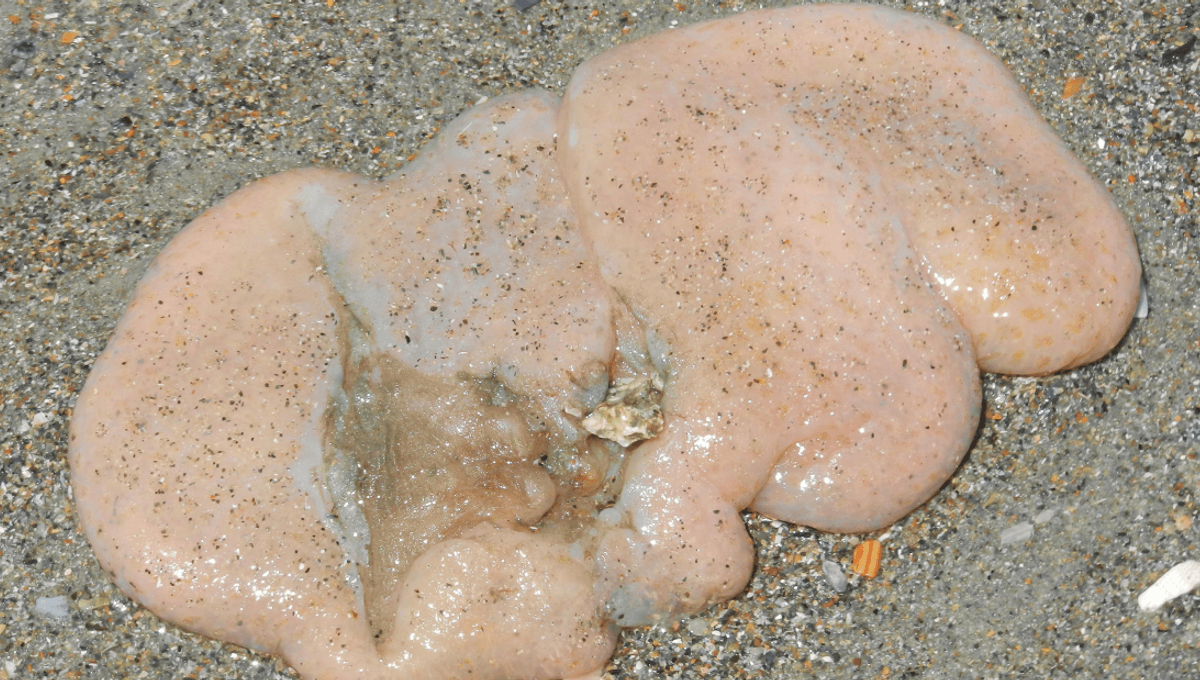
Mysterious blobs are the ocean’s bread and butter, as anyone who’s lived near a beach will tell you. All kinds of suspicious lumps can wash ashore, but among them, one of the most peculiar is sea pork, a porcine-like blob that’s meaty, but probably not all that appetizing.
Sea pork refers to several species of tunicates, a bizarre group of marine animals that are actually one of our closest invertebrate relatives. Their jellyfish-like appearance leads many to assume they’re closely related, but tunicates are actually more closely related to humans than they are jellyfish.
The tunicates Aplidium californicum, Aplidium solidum, and Aplidium stellatum are the usual suspects when it comes to sea pork, gelatinous, pock-marked blobs that are often found by beach walkers. Sea pork gets its name for its appearance, coming in a host of meaty hues including fleshy pink, hepatic purple, and muscular beige.
In life, sea pork lives on hard, rocky surfaces, which makes it prone to being flung ashore during strong winds and hurricanes. This is why the glistening blobs are often found splatted on the shoreline, looking like disembodied organs when in fact they are simply beached marine animals.
If you’ve ever seen pork belly and its characteristic glistening fat, you’ll likely see the resemblance. Tunicates have been eaten across the world for centuries, and with their meat being made up of animal protein, it’s landed itself a similar role to things like pork, starring in tacos, pasta, pizza, and meatballs, explains Pronofa.
Tunicates get their name for their tough, leathery outward surface, similar to the word tunic, and this is removed in the case of meongge, the South Korean name for their meat. However, the tunicate species that make up sea pork aren’t typically part of the menu, and it’s usually best to avoid eating anything you find on the beach.
There may be some perks to the unconventional meat, however, as research has found that eating sea squirts, another name for tunicates, can reverse signs of aging in mice. The tunicates were selected for study because they contain high levels of lipids called plasmalogens, something that we lose as we age.
Researchers gave plasmalogens to middle-aged female mice in much higher concentrations (around 300 to 500 times higher) than would normally be found in a portion of, say, chicken or scallops, and tested their memory and number of stem cells, neurons, and neural connections. After three months on a tunicate diet, they saw improvements in all areas.
Perhaps a tunicate a day keeps the doctor away? But we don’t recommend sourcing your own.
All “explainer” articles are confirmed by fact checkers to be correct at time of publishing. Text, images, and links may be edited, removed, or added to at a later date to keep information current.
The content of this article is not intended to be a substitute for professional medical advice, diagnosis, or treatment. Always seek the advice of qualified health providers with questions you may have regarding medical conditions.
Source Link: Found A Mysterious Blob On The Beach? You Could Be Looking At Sea Pork